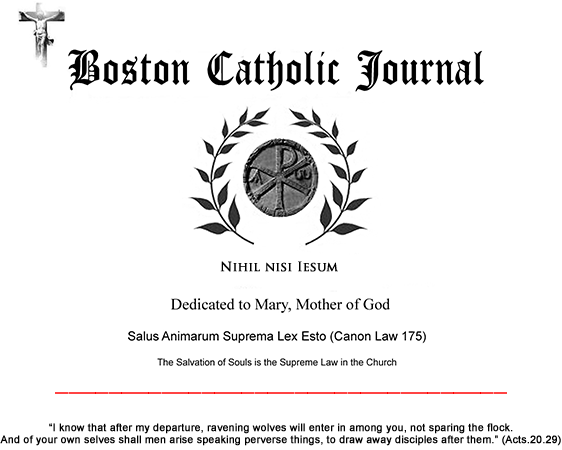| |
|||||||||||||||||||||||||||||||||||
|
CHAPTERS |
|||||||||||||||
Prudence in Action
|
“DO
NOT yield to every impulse
and suggestion but consider things carefully and patiently
in the light of God’s will. For very often, sad to say,
we are so weak that we believe and speak evil of others
rather than good. Perfect men, however, do not readily
believe every talebearer, because they know that human
frailty is prone to evil and is likely to appear in
speech. |
Click
here to listen to this chapter
Sister’s Commentary:
Do
you realize that when you disclose
the sin of another, you become guilty of that sin ... and more,
for you add to it the sin of slander and gossip! Whether publicly
or privately (you know, “I shouldn't tell you this, but ...”,
“Between you and me ...”, “I am telling you this in secret ...”
— sound familiar?) when you uncover, disclose, reveal the sin
of another to anyone under any circumstances ... you make
that sin your own. And with the sin the guilt. And with the guilt
the just punishment (that in all likelihood you would happily see
visited upon your neighbor who sinned first).
Read that again.
This chapter possesses great wisdom in few words. It reaffirms our
need to pray over the human encounters that we have with others
in our daily lives.
We have all seen the havoc, the damage , disaster and wreckage that
a hurricane, a tsunami, or an earthquake can bring. Equally devastating
and as broadly destructive can be the havoc and chaos wrought by
the human tongue when it is not tethered by love and breaks loose
of the Commandments of God. Like the tsunami, its effects extend
far beyond what we could possibly anticipate. It is whispered in
one ear ... and pours out of the mouths of thousands. Would that
the Gospel were communicated so quickly, so broadly ... and so eagerly!
Saint James unsparingly warns us of the danger of the human tongue:
and he does so in absolutely clear and unambiguous terms:
|
“The tongue is a fire, a world of iniquity. The tongue is placed among our members, which defileth the whole body, and inflameth the wheel of our nativity, being set on fire by hell. For every nature of beasts, and of birds, and of serpents, and of the rest, is tamed, and hath been tamed, by the nature of man: But the tongue no man can tame, an unquiet evil, full of deadly poison.”1 |
Thomas A Kempis is
doing likewise.
Human relationships (which are always delicate), families, and even
entire communities can be so severely wounded if not utterly broken
and scattered, by the malicious activity of the tongue which lends
itself so easily to the evil of gossip and tale bearing.
We have such a tremendous personal responsibility in our conversations
and verbal exchanges — and few of us take thought of it. The words
leave our mouths and as quickly as they pass, so does our responsibility
for anything that ensues as a result of them — or so we mistakenly
think. They are, after all, “just words”, uttered in mere seconds
— and kept in the same confidence in which you had kept it ... which
is to say, none! But you cannot call them back! As Confucius wisely
observed, “One cannot unsay what one has said.”
Be the floodgate against that tide of poison! Let is stop with you
and go no further! Your “confidential friend” does not live in isolation,
and neither do you. If she has spoken ill of another, betrayed the
trust of another, revealed the sin of another, she will speak ill
of you, as easily betray you, and reveal your own sins and indiscretions
as readily as she revealed the sins of others to you — and with
the same false promise with which she first disclosed it to you.
In many ways, by their tongues you will know your friends.
Needless to say, in our own conversations many of us are guilty
of proffering “tidbits” of lethal information that can easily assassinate
the character of another. How reluctant, how slow we are to cloak
the actions of others in charity rather than exposing them to shame!
We must recognize and be aware of this sinfulness within us that
wittingly or not lures others, subtly encourages others, to also
propagate sin through gossip. This much needed awareness should
make us, at such times of temptation, to choose to die to our selves
and our own wills and desires and to choose what we know God would
have of us. No sin, we soon come to find, is entirely personal after
all; it always affects, and most often poisons, others.
What, then, are we to do in the problematic situation where, in
some way or another, we become involved in an encounter fraught
with moral or spiritual danger to another?
Are we to say nothing? Do nothing? Let evil pass?
It is a false concept of charity if we see a person in moral danger,
from sex, drugs, drink and make “charitable excuses” for them, which
not oinly pander to their sins but perpetuate them because we do
not have the courage of the conviction to help them. We have a duty
to protect and nurture life. It is a three-fold duty: to God Who
created them and loves them, to they themselves who either fail
to apprehend the good or have not the strength to seize it, and
to ourselves upon whom it is incumbent to be "our brother’s keeper.”
But, in such a given situation, first we must first carefully examine
our own motivations and intentions with great honestly, being certain
of facts (not our imaginings!) and speaking directly — and discreetly
— to those involved. Christ Himself tells us very clearly,
“If
thy brother shall offend against thee, go, and rebuke him between
thee and him alone.”
2
Some situations may be more difficult and delicate. Thomas gives
such wise advice here: seek counsel from those in a position to
do so, a priest, someone anointed to care and guide souls. What
the Priest may say may or may not be pleasing to you, but obey his
directives, and God who sees your obedience and desire for good
will bring some greater good out of the situation than any counsel
that you alone can impart.
Saint Francis de Sales speaks of this eloquently and at greater
length in his renowned spiritual work, "An Introduction to the
Devout Life” which should be, together with the “Imitation
of Christ” and “Abandonment to Divine Providence” by
Father Jean-Pierre de Caussade (with the translation by John
Beevers), on the reading list of every Catholic. For
your convenience,
St. Francis
De Sale's treatment on this subject is available as a printable
PDF file by clicking here.
It is wonderful
and profitable reading!
______________________________________
1
Saint James 3.6-8
2
Saint Matthew 18.15
Your Little Sister in Christ
 Printable PDF Version of Sister's Commentary Chapter 4
Printable PDF Version of Sister's Commentary Chapter 4
|
Totally Faithful to the
Sacred
Deposit of Faith
entrusted to the Holy See in Rome
“Scio
opera tua ... quia modicum habes virtutem, et servasti verbum
Meum, nec non negasti Nomen Meum”
Copyright © 2004 - 2026 Boston Catholic Journal. All rights reserved. Unless otherwise stated, permission is granted by the Boston Catholic Journal for the copying and distribution of the articles and audio files under the following conditions: No additions, deletions, or changes are to be made to the text or audio files in any way, and the copies may not be sold for a profit. In the reproduction, in any format of any image, graphic, text, or audio file, attribution must be given to the Boston Catholic Journal.
|






















